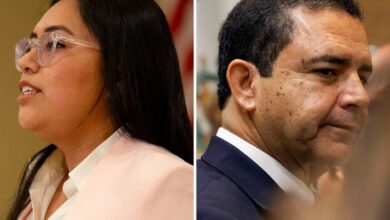
How Do You Feel About The New, Every Student Succeeds Act (ESSA)?
President Barack Obama today signed into law the Every Student Succeeds Act (ESSA), which reauthorizes the nation’s primary federal education law, the Elementary and Secondary Education Act (ESEA). Previously called the No Child Left Behind (NCLB) Act when it was reauthorized under President George W. Bush in 2001, the law sets forth expectations for academic accountability, educator quality, and the use of federal funding for wide-ranging education programs.
Although viewed as a long-overdue victory by most in the education field, there are some who have criticized the ESSA, saying that it does not go far enough to remove the federal government’s role or that it backs too far away from test-based accountability measures. Presidential candidate and U.S. Sen. Ted Cruz (R-Texas) voted against the bill,complaining that it represented “the same tired approach that continues to fail our nation’s children.” Sandy Kress, who is credited with creating the NCLB plan for President Bush and who shortly thereafter became a lobbyist for the testing industry, called the enactment of the ESSA “pitiful” in tweets this week.
After years of waiting for reauthorization, ATPE and many other educator groups are celebrating Congress’s abandonment of failed NCLB strategies and policies embedded in the Obama administration’s waivers, and we are welcoming the new ESSA with cautious optimism. ATPE is grateful to our Washington-based lobby team for helping us in our efforts to persuade Congress to pass a reauthorization bill this year and for sharing our input on the federal law repeatedly with lawmakers and U.S. Department of Education staff. We also thank our many state officers and staff members who traveled to the nation’s capitalover the years to share their stories in the hope of improving the country’s premier education law.
This new “law of the land” for education aims to reduce the federal role in states’ education policies while ensuring accountability for educating students in various subgroups and closing achievement gaps. Ditching the controversial requirements for Adequate Yearly Progress (AYP), the ESSA gives states and school districts more flexibility to create their own accountability systems and interventions for struggling schools. As of next summer, it will nullify the controversial waiver system of recent years that has required many states, including Texas, to pursue reforms not often favored by education stakeholders, such as teacher evaluations tied to student test scores. It also repeals the complex “highly qualified teacher” mandates from NCLB, replacing them with new provisions for “effective” teachers.
As for curriculum and related matters, the ESSA requires states to adopt standards but prohibits the U.S. Secretary of Education from dictating what those should be. While Congress avoided putting ATPE-opposed funding portability language into the final bill, the ESSA does include a provision for a school choice pilot program in 50 school districts that would enable state, local, and federal funds to follow students from one school to another. With respect to testing, the ESSA keeps in place many of the existing requirements. States will still be expected to test students in reading and math in grades 3 through 8, plus one high school test, but that test that could become the SAT or ACT based on school districts’ discretion.
In remarks during the bill signing ceremony this morning, President Obama called the ESSA “a big step in the right direction,” but added that the hard work would come with implementation. It is worth noting that many of the changes in the federal law will require similar actions by state legislatures and policymakers to be fully effective nationwide. For instance, the 2017 legislative session is the earliest opportunity for lawmakers to choose whether or not to tinker with Texas’s state STAAR testing requirements, which underwent a major overhaul in 2013 via the passage of House Bill 5.
It remains to be seen what short-term impact, in particular, the enactment of the ESSA will have on Texas’s pending effort to adopt a new state-recommended appraisal system for teachers known as T-TESS. The Texas Education Agency’s plans for T-TESS have been heavily influenced by strings attached to the state’s ESEA waiver, including pressure from the federal government to base at least 20 percent of teachers’ evaluations on student growth data. In a statement this week about the passage of the federal law, Texas Commissioner of Education Michael Williams said that “the rollout of our state’s new teacher and principal evaluation systems will continue, but without federal demands to include student test scores as a mandatory aspect.” Williams is resigning at the end of this month, but has already proposed new commissioner’s rules to implement T-TESS and repeal its predecessor, known as PDAS.
Those rules, which were developed before the passage of the new federal law, are currently open for review and public comment through January 11. As drafted, the commissioner’s rules for T-TESSrequire teacher appraisals to “include the academic growth of the teacher’s students at the individual teacher level as measured by one or more of the following student growth measures: (1) student learning objectives; (2) student portfolios; (3) pre- and post-test results on district-level assessments; or (4) value-added data based on student state assessment results” starting in 2017. The proposed rules also specify that student growth “shall count for at least 20% of a teacher’s summative score.”
The one thing we know for certain is that big changes are on the horizon. As with our efforts to push Congress to reauthorize the ESEA, ATPE will remain heavily involved in the implementation work at the state and national levels. Making sure that the renewed national focus on lessening the outsized role of standardized tests is reflected in our state laws and policies going forward will be a top priority. Stay tuned to Teach the Vote for updates from our lobby team.
This article Originally Published by Jennifer Canaday December 10, 2015 in Teach The Vote.
Previous Comments:
AmericanMom: The 20th century changed the education system from “progressive” to “inclusive”. At this turn of the century the idea of education for all was born, making state controlled free public education available and attendance mandatory. At the time social manners, roles, expectations, rules, social values, rituals and so forth were conspired by common social norms of society. A blanket explanation would be to simply say all the above categories were much stricter back in the day.
Today the education system fails at education, let alone socialization, manners, and values. Rituals such as the Pledge of Allegiance are no longer practiced in most schools, not to mention the dozens of new age policies regarding student rights, bullying, transgender/transsexual/bisexual/gay and lesbian protection clauses, participation rights, permissions and so on.
I think the education system of the 21st century encompasses the worst of all three sociological theories.
“In structural-functional theory, education is a social mechanism for establishing and reinforcing social roles. It also plays a key role in the socialization process by providing technical knowledge and skills and imparting social values
With regard to this theory our education system is failing miserably by its inept ability in “providing technical knowledge and skills and imparting social values”. All schools focus on, standardized testing as a measurement of “success” and to receive more funding, so they can waste it on vending machines and new landscaping for schools just like SMCISD and their unnecessary Bond packages for admin buildings instead of computers in classrooms .
Actual curriculum is based off of standardized tests teaching to the lowest common denominator, thanks to our political system ideology of “No child left behind” therefore imparting the social value that less is acceptable and less is offered.
Conflict theorists believe education reinforces social inequalities. Schools teach not only academic subjects but also a hidden curriculum such as rules of socially accepted behavior—competition, obedience, one’s place in society, and conformity.
This concept continues my rant above about policies, clauses and permissions now allowed in the education system. While the praise of those with better educational credentials comes to pass after college, it doesn’t seem to be alive and well in the K-12 stages, as all the attention goes to those performing the worst instead.
And the reinforcement of social inequalities is almost the predominate focus of schools these days, and it certainly isn’t hidden. Focusing on social acceptance through progressive notions such as “you’re free to be a bird or a bee….my son can wear a dress to school if he wants to” is the polar opposite of the 20th century socialization occurring in the education system.
Last but not least, Symbolic Interaction Theory sees the educational system as reinforcing stereotypes. Our social processes are based on everyday interactions with others who expect us to behave in a “certain way”. I wish this were the case. I wish there were social processes in place and demanded behavioral expectations of students, kids, and parents!
Students are given academic attention based on test scores not abilities, they have more rights, privilege’s and permissions to speak and behave in any manner they wish almost completely without consequence and with teacher student ratio’s so far out of whack opportunities and motivations are abandoned.
Today the education system fails at education, let alone socialization, manners, and values. Rituals such as the Pledge of Allegiance are no longer practiced in most schools, not to mention the dozens of new age policies regarding student rights, bullying, transgender/transsexual/bisexual/gay and lesbian protection clauses, participation rights, permissions and so on.
I think the education system of the 21st century encompasses the worst of all three sociological theories.
“In structural-functional theory, education is a social mechanism for establishing and reinforcing social roles. It also plays a key role in the socialization process by providing technical knowledge and skills and imparting social values
With regard to this theory our education system is failing miserably by its inept ability in “providing technical knowledge and skills and imparting social values”. All schools focus on, standardized testing as a measurement of “success” and to receive more funding, so they can waste it on vending machines and new landscaping for schools just like SMCISD and their unnecessary Bond packages for admin buildings instead of computers in classrooms .
Actual curriculum is based off of standardized tests teaching to the lowest common denominator, thanks to our political system ideology of “No child left behind” therefore imparting the social value that less is acceptable and less is offered.
Conflict theorists believe education reinforces social inequalities. Schools teach not only academic subjects but also a hidden curriculum such as rules of socially accepted behavior—competition, obedience, one’s place in society, and conformity.
This concept continues my rant above about policies, clauses and permissions now allowed in the education system. While the praise of those with better educational credentials comes to pass after college, it doesn’t seem to be alive and well in the K-12 stages, as all the attention goes to those performing the worst instead.
And the reinforcement of social inequalities is almost the predominate focus of schools these days, and it certainly isn’t hidden. Focusing on social acceptance through progressive notions such as “you’re free to be a bird or a bee….my son can wear a dress to school if he wants to” is the polar opposite of the 20th century socialization occurring in the education system.
Last but not least, Symbolic Interaction Theory sees the educational system as reinforcing stereotypes. Our social processes are based on everyday interactions with others who expect us to behave in a “certain way”. I wish this were the case. I wish there were social processes in place and demanded behavioral expectations of students, kids, and parents!
Students are given academic attention based on test scores not abilities, they have more rights, privilege’s and permissions to speak and behave in any manner they wish almost completely without consequence and with teacher student ratio’s so far out of whack opportunities and motivations are abandoned.
With the exception of rulers smacking knuckles, if I had it my way my own kids would be going to school eighty years ago.
The education system started its downward spiral with me and my Millennial generation. We started making the rules, the excuses and telling the teachers what they could and could not do. Socialization in my education as a child was all about breaking down boundaries within the system.
What could you get away with? Daycares, metal detectors, soda machines, fast food offerings and as many bells and whistles booster club moms and PTA members could come up with, consumed all seven high schools I attended across the country.
Social behaviors during my education was all about being treated as equals with “superiors” teachers, principals and one’s own rights all of which completely deterred the point of an education. It seems it has all only gotten socially worse and literally more dangerous.
Cant wait to see how this new ESSA allows States, schools and teachers to take back the long since buried performance and behavior expectations Americans use to know.
What could you get away with? Daycares, metal detectors, soda machines, fast food offerings and as many bells and whistles booster club moms and PTA members could come up with, consumed all seven high schools I attended across the country.
Social behaviors during my education was all about being treated as equals with “superiors” teachers, principals and one’s own rights all of which completely deterred the point of an education. It seems it has all only gotten socially worse and literally more dangerous.
Cant wait to see how this new ESSA allows States, schools and teachers to take back the long since buried performance and behavior expectations Americans use to know.





